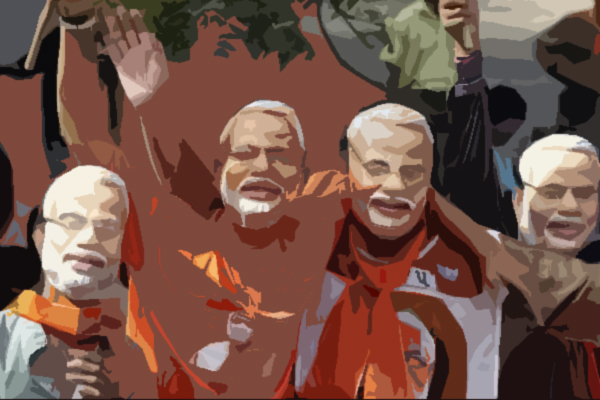The new Bhakti Movement
Ravi Shanker Kapoor | April 19, 2018 11:06 pm

Jawaharlal Nehru had (and still has) his admirers, Indira Gandhi her sycophants, and Sonia Gandhi her toadies. Narendra Modi is one up on all of them; he has admirers, sycophants, toadies—and a zillion bhaktas. He is the only Prime Minister who has bhaktas, perhaps the only big leader in Independent India who has had bhaktas in such large numbers.
On the face of it, this is a great asset: a legion of bhaktas rooting for him all the time on all issues under all circumstances. Whatever he says is received as gospel truth; whatever he or his government does—whether it is the surgical strike or something as damaging as demonetization—is lauded; he is accepted as an infallible leader, an all-knowing visionary who has charted a course towards a bright future. Conversely, whoever raises questions about his policies and actions is hauled over the coals; his rivals are portrayed in darkest shades; they, we are told, represent vested interests at best and betray their country at worst. They should be sent to Pakistan, the bhaktas’ version of perdition.
So far so good. But then the bhaktas also create a veil of maya all around, conjuring up a virtual world so to speak; and such are the meretricious charms of this make-believe world that the bhaktas themselves get bewitched by them; they start living in it and confusing it with the real world. An illustration: one of my friends was a member of an advisory panel of the Central Board of Film Certification (CBFC). He recounts stories about the pigheadedness and incredible stupidity of some CBFC panel members, many of whom are there just because of their unflinching devotion to Modi. One of them objected to the reference to poverty in a movie. This bhakta’s objection was that since the ascension of Modi in May 2014, poverty has vanished from the country, so the reference is an affront to the nation!
Illustrations can be multiplied. Anybody who has dared to engage with Modi- bhaktas knows that they are the most excitable lot, ready to take offence at even the mildest censure of their god, suspicious of any attitude towards their deity that is short of veneration, and prone to making intemperate remarks and using profanities for anybody they deem critical of the Prime Minister. Their favorite line of defence is: it takes time to clean the mess created by six decades of bad governance. The upshot is: everything wrong in the country was caused by the previous regimes; Modiji is busy in righting every wrong, which is a long process.
By the way, it has been the Congress’ defence mechanism as well: all the problems in Independent India are because of 200 years of British rule. Some grand old party grandees like Shashi Tharoor take argument to preposterous lengths; in their scheme of things, every possible ill India is afflicted with today, and will be for next ten thousand years, is because the British ruled India for 200-odd years.
The bhaktas have also borrowed the Left’s favorite weapon of mass deception—argumentum ad hominem. It is a reprehensible form of argumentation in which the arguer rather than the argument is attacked. For instance, instead of countering senior Bharatiya Janata Party leader Subramanian Swamy’s allegations against Congress leaders Sonia Gandhi, Rahul Gandhi, and P. Chidambaram on facts, their party colleagues accuse Swamy of being a politically motivated person and worse. Similarly, Modi-bhaktas respond to any criticism of the government, especially of the Prime Minister, with indignation and vituperation.
Worse, whatever the bhaktas say, they also believe in; their honesty is a big problem; this makes them qualitatively different from, and far more dangerous than, sycophants.
The sycophant knows which side of his bread is buttered. His sayings and doings are objective-specific and profit-oriented. His modus operandi may be morally repugnant to others, but it is not irrational. He may speak lies, but he doesn’t live in mendacity. He is not blind; he knows when his ingratiating ways outlive their utility. So, Dev Kant Baruah, the Congress president during the Emergency, infamously said at that time, “Indira is India and India is Indira”; but soon after she lost the 1977 general election, the man who epitomized sycophancy abandoned her (That his political calculation proved to be erroneous in his quitting is another matter, for she came back impressively).
Like Keynes who changed his mind when the facts changed, sycophants shift their allegiance when political equations change. Sycophants are transferable even though coteries are not.
The world that the bhakta creates for his own dwelling may be a lie, but he doesn’t live a lie; for he believes that world to be true and real. The sycophant, on the other hand, lives a lie. The former is a silly idealist, the latter a sound cynic.
What makes the bhakta downright dangerous is that his arrival in the political arena is the revival of a retrograde proclivity in our tradition—the Bhakti or Devotion Movement. It laid the greatest emphasis on the devotee’s fervent attachment to and love for a personal god. It privileged devotion over knowledge and action. In the second millennium, the tendency became endemic, afflicting Hindu philosophy, theology, religious practice, culture, society—actually afflicting everything and sapping vitality out of the Indian civilization. The denouement was a thousand years of slavery and a lost millennium. Tellingly, the word darshan, which meant philosophy, transmogrified into divine revelation; philosophy was eclipsed by religion, thus killing analytical, critical thinking.
The bhaktas can be dangerous for Modi, for they have created a fantasyland that may charm him into smugness and complacency. But they are a bigger danger for the country, as they are the vectors of the ancient disease called Bhakti.






























